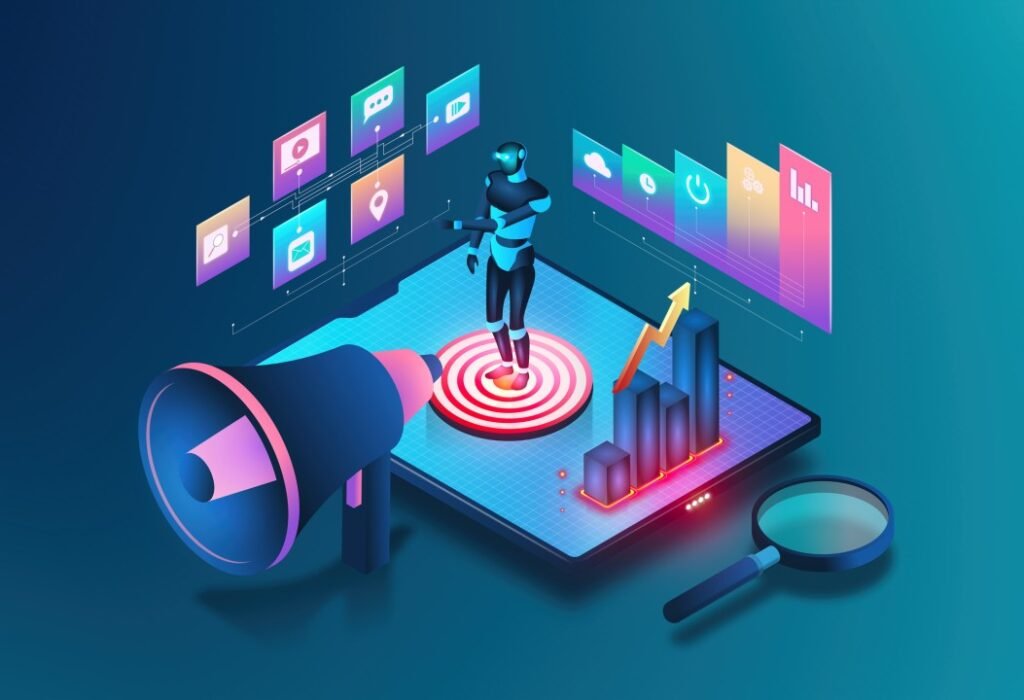Introduction
Artificial Intelligence (AI) is revolutionizing the marketing landscape by enabling businesses to understand their customers better, optimize campaigns, and automate repetitive tasks. From predictive analytics that forecast customer behavior to content automation that streamlines creation and delivery, AI is becoming an indispensable tool for marketers aiming to boost efficiency and effectiveness.
In this blog, we will explore how AI is transforming marketing through predictive analytics and content automation, the benefits it offers, and the challenges marketers must consider.
What is AI in Marketing?
AI in marketing refers to the use of machine learning algorithms, natural language processing, and other AI technologies to analyze data, generate insights, and automate marketing processes. Unlike traditional marketing methods that rely heavily on intuition and manual analysis, AI leverages vast amounts of data to provide data-driven decisions and personalized experiences at scale.
Predictive Analytics: Anticipating Customer Behavior
One of the most impactful applications of AI in marketing is predictive analytics. This technology analyzes historical and real-time data to forecast future customer actions, enabling marketers to target prospects with precision.
How Predictive Analytics Works
- Data Collection: AI systems gather data from multiple sources such as website interactions, social media, CRM systems, and purchase history.
- Pattern Recognition: Machine learning models identify patterns and correlations in the data that humans might miss.
- Forecasting: The system predicts outcomes such as customer churn, purchase likelihood, or optimal timing for marketing outreach.
Benefits of Predictive Analytics in Marketing
- Improved Customer Segmentation: Marketers can create highly specific segments based on predicted behaviors, increasing campaign relevance.
- Optimized Campaign Timing: Predictive models help determine the best times to send emails or launch ads, improving engagement.
- Increased ROI: Targeting the right customers with the right message reduces wasted ad spend and improves conversion rates.
- Enhanced Customer Retention: By predicting which customers are likely to churn, businesses can proactively engage and retain them.
Content Automation: Streamlining Creation and Delivery
Creating quality content consistently is a major challenge for marketers. AI-powered content automation tools alleviate this pressure by assisting in content creation, curation, and distribution.
Types of Content Automation
- Automated Content Generation: AI can generate written content such as product descriptions, social media posts, or reports based on data inputs.
- Content Personalization: AI customizes website content, emails, and ads based on individual user preferences and behaviors.
- Content Scheduling and Distribution: Tools use AI to determine the best channels and times to publish content for maximum reach.
Benefits of Content Automation
- Time Efficiency: Automating repetitive tasks frees up marketers to focus on strategic planning.
- Consistency: AI ensures that content is delivered regularly and maintains a consistent brand voice.
- Scalability: Businesses can scale content marketing efforts without proportionally increasing resources.
- Improved Engagement: Personalized content resonates more with audiences, leading to higher interaction rates.
Real-World Examples of AI in Marketing
- Netflix uses AI-powered predictive analytics to recommend shows and movies tailored to individual user preferences, driving engagement and subscription retention.
- HubSpot offers AI tools that help marketers automate email campaigns and personalize messages based on customer lifecycle stages.
- The Washington Post employs AI-driven content generation to produce news summaries and updates quickly, increasing output without compromising quality.
Challenges and Considerations
While AI brings many advantages to marketing, it also poses certain challenges:
- Data Privacy: Collecting and using customer data responsibly is critical to maintaining trust and complying with regulations like GDPR.
- Quality Control: Automated content may lack the nuance and creativity of human-created material, requiring oversight.
- Algorithm Bias: AI models trained on biased data can produce skewed or unfair marketing outcomes.
- Integration: Implementing AI tools requires alignment with existing marketing strategies and systems.
The Future of AI in Marketing
AI’s role in marketing will continue to expand with advancements in technology. We can expect:
- More sophisticated predictive models that combine multiple data sources for deeper insights.
- Increased use of AI in conversational marketing through chatbots and voice assistants.
- Greater emphasis on ethical AI use, transparency, and customer consent.
- Enhanced AI tools that help marketers measure campaign impact and adapt strategies in real-time.
Conclusion
AI is no longer a luxury but a necessity in modern marketing. By harnessing predictive analytics and content automation, marketers can deliver more personalized, timely, and effective campaigns that drive results. However, success depends on balancing technological innovation with ethical considerations and human creativity.
Embracing AI thoughtfully will empower businesses to build stronger customer relationships and stay competitive in an increasingly digital world.


